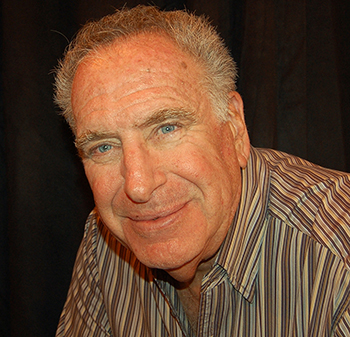
Arnold Mittelman
With the partnership of Arnold Mittelman, students can now exercise their creativity in a brand new way when learning about the Holocaust in IWitness.
Mittelman is a theater producer, director, educator and administrator who has created almost 300 productions of plays, musicals and special events. He helped found and lead not-for-profit theaters including the Coconut Grove Playhouse in Miami. He is founder, president and producing artistic director of the National Jewish Theater Foundation (NJTF), which celebrates creativity and preserves Jewish culture in the performing arts.
NJTF partnered with IWitness to produce a new IWitness activity called “What I’ve ‘Scene’: Theatrical Depictions of Survivor Stories,” the first theatre arts-inspired activity.
Mittelman said NJTF, through its Holocaust Theater International Initiative, wanted to create a Holocaust educational activity with a theatrical component, which is not very common among Holocaust educational materials. He was introduced to USC Shoah Foundation through Holocaust scholar Michael Berenbaum and thought IWitness would be an ideal partner to bring such an activity directly to classrooms around the world.
Mittelman, along with USC Shoah Foundation education staff and Mira Hirsch, founder and artistic director of Genesis Stage in Atlanta, developed an activity that instructs students to perform their own theatrical tableaus depicting Holocaust survivor testimonies in IWitness. Students narrate their chosen clip and act out three to five different tableaus, with costumes and props, that illustrate key moments in the survivor’s story.
It was important to Mittelman that students actively participate in the experience of testimony – not just be a passive audience.
“When you speak another person’s words, when you play the role of someone else, you are stepping outside of yourself into another place,” he said. “As a result, you have a chance to think about it in a wholly different way and no longer be someone like yourself.”
Mittelman has seen firsthand the long-lasting effect that theatre has on people. When speaking with people about their experiences with theatre, he often asks how many of them have ever been in a play, and if they can still remember the experience. Most people have vivid memories.
“Then I ask, ‘How many of you can repeat or remember lines?’ And most people still can no matter how long ago it was,” Mittelman said. “That tells me that the notion of playing a role, even though it is not you, is a very important thing. It leaves an indelible impression of deeper understanding and awareness.”
It was Hirsch’s idea to have the students create tableaus as opposed to acting out scenes with dialogue. This way, students who aren’t comfortable with acting can still contribute in other ways, and the activity becomes more of a group project.
Mittelman also pointed out that this is an ideal activity for secondary students since most of the survivors they will portray were about the students’ age during the Holocaust. Students will be able to empathize even further with the survivors knowing that they were kids just like them when they went through these experiences.
“What I’ve ‘Scene’” is for all students, not just performing arts classes. Mittelman said he hopes the experience simply helps students put themselves in a survivor’s shoes and create a personal, long-lasting connection to the material.
“My goal, and the goal of our efforts together, is that all younger people will be able to participate,” Mittelman said. “It’s not about how well you act but more about how deeply you understand.”